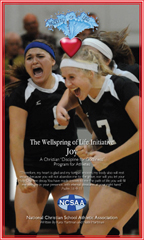Joy in the Face of Sorrow?
By Nate Hartman
October 3, 2011 This is the eighth in a season-long series of posts on the topic of joy, as it relates to the life and athletic pursuits of your teams. These weekly posts will correspond with each weekly study from The Wellspring of Life Initiative, a unique "Discipline for Godliness" program for athletes developed by the NCSAA (and available to all member schools, as part of their membership). This post corresponds with Week 7: "Joy in the Face of Sorrow?"
This is the eighth in a season-long series of posts on the topic of joy, as it relates to the life and athletic pursuits of your teams. These weekly posts will correspond with each weekly study from The Wellspring of Life Initiative, a unique "Discipline for Godliness" program for athletes developed by the NCSAA (and available to all member schools, as part of their membership). This post corresponds with Week 7: "Joy in the Face of Sorrow?"
1 Hear me, Lord, and answer me, for I am poor and needy. 2 Guard my life, for I am faithful to you; save your servant who trusts in you. You are my God; 3 have mercy on me, Lord, for I call to you all day long. 4 Bring joy to your servant, Lord, for I put my trust in you.
5 You, Lord, are forgiving and good, abounding in love to all who call to you. 6 Hear my prayer, Lord; listen to my cry for mercy. 7 When I am in distress, I call to you, because you answer me.
8 Among the gods there is none like you, Lord; no deeds can compare with yours. 9 All the nations you have made will come and worship before you, Lord; they will bring glory to your name. 10 For you are great and do marvelous deeds; you alone are God.
11 Teach me your way, Lord, that I may rely on your faithfulness; give me an undivided heart, that I may fear your name. 12 I will praise you, Lord my God, with all my heart; I will glorify your name forever. 13 For great is your love toward me; you have delivered me from the depths, from the realm of the dead.
14 Arrogant foes are attacking me, O God; ruthless people are trying to kill me — they have no regard for you. 15 But you, Lord, are a compassionate and gracious God, slow to anger, abounding in love and faithfulness. 16 Turn to me and have mercy on me; show your strength in behalf of your servant; save me, because I serve you just as my mother did. 17 Give me a sign of your goodness, that my enemies may see it and be put to shame, for you, Lord, have helped me and comforted me.
Psalm 86
- Is this a joyful psalm written at a carefree and happy time in the life of the psalmist (King David)? How would you describe the situation, and what is David’s mood? What may have been happening at this time in his life, to inspire a psalm like this? For what does David ask God (v. 4)?
- Have you ever felt so overwhelmed by things happening in your life, or by things you’ve done wrong, that you pleaded for God to give you joy? Have you ever disappointed your coaches or let your team down, due to the way you’ve practiced — or the way you’ve played in a big game? How did you feel? (That was only a game, yet the feeling is horrible.) How do you find joy, in times like those?
- People have proved themselves to be sinful, faithless, and to turn from God again and again. Why, then, would God grant you joy when you ask for it? Why does David expect to receive joy from God; is it because he deserves it (v. 5, 15)? What causes David to have confidence that God will answer his cry for joy (v. 7, 13)?
- David recognizes that he needs God to produce a change in his life; thus, he prays for what two things (v. 11)? Are you a teachable athlete, or do you respond to coaches and teammates as if you already know it all? How does an athlete with an “undivided heart” act? Are you fully committed to pursuing the good of the team, or are you sometimes motivated by selfish goals? Do you truly desire that your athletic life be honoring to God, or do you profess that goal in words, but not in your play and relationships?
- Because he knows that he is unable to produce happiness in himself (“for I am poor and needy” - v. 1) and because he knows that God is merciful (v. 3), David pleads with the Lord for joy. At times when you feel your joy is gone, try this! It’s OK to plead for joy — David did. As a team, how could you help one another to do this after a poor performance? Upon receiving bad news? When you’ve been unfaithful to something you should have done? Can you “call out to [God] all day long” (v. 3) together? Can you “put your trust in [Him]” (v. 4) together?
- Why does David ask for a sign of God’s goodness (v. 17)? Is it only for his own encouragement? Why might his enemies “be put to shame” by this sign? (Note the actions of these enemies in verse 14. For whom do they have no regard?) As an athlete, be slow to follow the thinking of your culture...Are your opponents your enemies? Do you need to have a dislike for your opponents, in order to compete vigorously against them? Who are these enemies that are described in verse 14? Should you desire that a person who does not know the Lord be “put to shame” simply so that you can get revenge and be proved right (Do not gloat when your enemy falls; when he stumbles, do not let your heart rejoice — Proverbs 24:17)? Might there be something else good that God could intend in that person’s recognition of their wrong?



